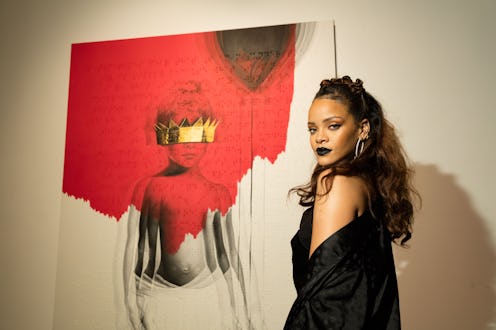Entertainment
Rihanna Is Here To Prove You Wrong
Rihanna has a lot of fans — a whole Navy of them, in fact — and in a very romantic interview, indie author Miranda July became one of her biggest. July profiled the 27-year old phenomenon as part of the New York Times' T Magazine series on The Greats, and was overtaken by Rihanna's soul and presence as the two discussed everything from sexuality and Googling childbirth, to why Rihanna doesn't have time for a man right now ("Guys need attention," she said, which she is not about doing at the moment). Perhaps the best moment among great moments was Rihanna addressing the racism she faces in her career, and declares that she won't be pigeon-holed into any type of stereotype of a black woman. "It's the thing that makes me want to prove people wrong," Riri said.
July was hesitant about asking Rihanna about race — as any white woman interviewing a black woman should be. But what came of the way she posed her careful question was amazing insight from Rihanna — July asked her if, when she moved from her native Barbados to New York City at the age of 16 to begin her music career, Rihanna began "experiencing race in a different way." She said:
You know, when I started to experience the difference — or even have my race be highlighted — it was mostly when I would do business deals... And, you know, that never ends, by the way. It’s still a thing. And it’s the thing that makes me want to prove people wrong. It almost excites me; I know what they’re expecting and I can’t wait to show them that I’m here to exceed those expectations.
Rihanna is well-aware of the dangers of branding and packaging musicians, especially black women making music. She went on to discuss her critical eye, turned outward not only on how she is perceived, but how she can negate those perceptions:
‘But I have to bear in mind that those people are judging you because you’re packaged a certain way — they’ve been programmed to think a black man in a hoodie means grab your purse a little tighter. For me, it comes down to smaller issues, scenarios in which people can assume something of me without knowing me, just by my packaging.’
And she is constantly changing, as July notes. The newest artwork for her upcoming album and the name itself, Anti, show Rihanna moving in a more art-minded direction, featuring Braille poetry and incredible contemporary artwork for the cover. Even the album's name signifies this sentiment Rihanna has, refusing to be made into anything she does not choose herself.
It excites me that Rihanna and other powerful black female musicians are talking frankly about race. I can't imagine the difficulty of presenting yourself and your art with such heavy expectations upon you from all sides. Rihanna, no surprise, is aware of all of it, but she somehow seems still serene. Miranda July in this interview calls it her "soul," and I personally wish I could access that frame of mind that allows Rihanna as a woman of color to digest the hype about her and still somehow manage to transcend it. It's difficult to be a brand and remain authentic, and the goal to escape stereotypes and racial expectations is a huge, overwhelming one. And she's right: racism never ends, and the most difficult part is finding ways to navigate and survive.
To be super-famous on top of that and scrutinized and have your identity constantly dissected — it's a tough reality that Rihanna bears with such coolness, ease, and grace, that no wonder Miranda July fell so easily in love with her.
